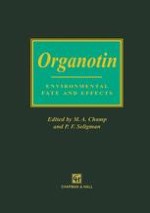1996 | OriginalPaper | Buchkapitel
Reproductive Failure in the Gastropod Nucella Lapillus Associated with Imposex Caused by Tributyltin Pollution: A Review
verfasst von : P. E. Gibbs, G. W. Bryan
Erschienen in: Organotin
Verlag: Springer Netherlands
Enthalten in: Professional Book Archive
Aktivieren Sie unsere intelligente Suche, um passende Fachinhalte oder Patente zu finden.
Wählen Sie Textabschnitte aus um mit Künstlicher Intelligenz passenden Patente zu finden. powered by
Markieren Sie Textabschnitte, um KI-gestützt weitere passende Inhalte zu finden. powered by
Most stenoglossan gastropods are gonochoristic (i.e. the sexes are separate). During the last two decades, the phenomenon of ‘imposex,’ the development of male sex organs on the female, has become increasingly prevalent, to the extent that >40 species worldwide are now known to exhibit the syndrome. Initial evidence linking imposex to the presence of the leachates of marine antifouling paints containing tributyltin (TBT) as a biocide was provided by studies of the American mudsnail Ilyanassa obsoleta, but no deleterious effect on its reproductive biology was detected. However, recent investigations of imposex in the European dogwhelk (Nucella lapillus) have demonstrated that in this species the effects of TBT can be profound, since breeding can be inhibited causing populations to decline and eventually disappear. This chapter summarizes the evidence that TBT pollution is responsible for the disappearance of N. lapillus in areas close to centers of boating activity.Two methods of measuring the intensity of imposex in N. lapillus are described, namely the relative penis size (RPS) index and the vas deferens sequence (VDS) index: these indices provide indications of the relative development of the female penis and of the associated vas deferens. When fully developed, vas deferens tissue blocks the oviduct preventing the release of egg capsules, thus rendering the female sterile. Field surveys of much of the UK coastline demonstrate that the intensity of imposex, as measured by both indices, increases markedly with proximity to sources of TBT such as harbors and marinas. Close to sources, females are sterile, breeding activity has ceased, and populations are declining or have disappeared. Transplantations of animals from ‘clean’ sites to such contaminated areas promote imposex in the transplanted animals. Laboratory experiments in which animals were reared from the hatchling stage to maturity at 2 y of age show that at an ambient TBT concentration in water of 1–2 ng l-1 Sn imposex is fully developed; at ⩾3 ng l-1 Sn all females are sterilized. At higher concentrations (⩾10 ng l-1 Sn) oogenesis is suppressed and is supplanted by spermatogenesis. Laboratory and field data indicate that imposex in N. lapillus is initiated at an ambient water TBT concentration of <1 ng l-1 Sn. The high sensitivity of this response provides one explanation for the fact that imposex is found throughout the species’ geographic range except in remote areas (e.g. parts of northwest Scotland). In those areas where TBT pollution exceeds 2 ng l-1 Sn, the sterilizing effect of imposex is apparent in the lack of breeding activity and dwindling population numbers.
